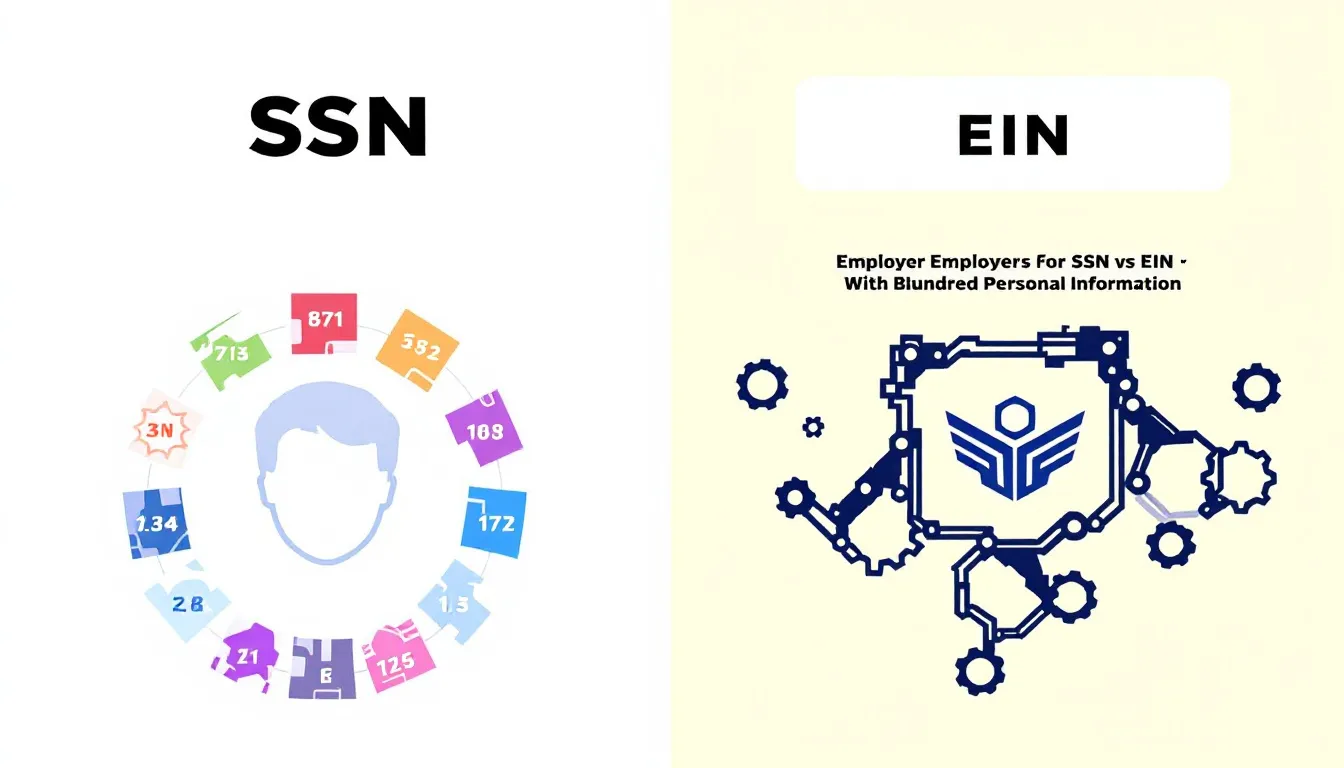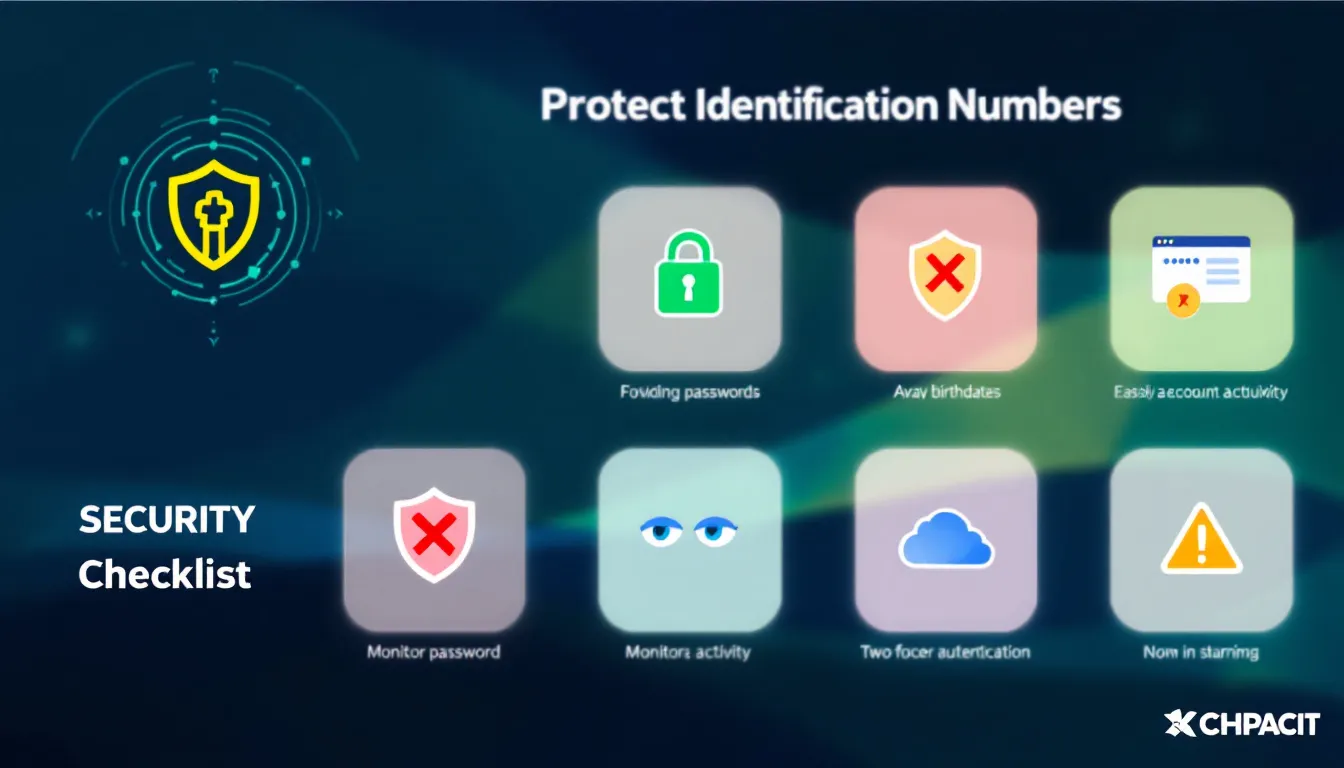SSN, EIN, or ITIN: Which One Do You Need to Start Your LLC?
Deciding between using an SSN (Social Security Number) and an EIN (Employer Identification Number) for your business is crucial for proper tax management and legal compliance, especially when considering the implications of ssn ein. This guide will help you understand the key differences, advantages, and how to obtain each number.
Key Takeaways
- A Social Security Number (SSN) is primarily for individual identification, while an Employer Identification Number (EIN) serves to identify business entities, offering advantages like separating personal and business finances.
- Choosing between an SSN and an EIN is influenced by business structure, future growth plans, and legal requirements; obtaining an EIN is advisable for businesses anticipating hiring and expansion.
- Protecting identification numbers, including SSNs and EINs, is critical to prevent identity theft; best practices include minimizing sharing, securely storing documents, and monitoring for unauthorized activity.
Understanding Social Security Numbers (SSN)
A Social Security Number (SSN) is a nine-digit number issued by the Social Security Administration (SSA) primarily for identification and taxation purposes. This taxpayer identification number is essential for U.S. citizens, permanent residents, and temporary working residents. While its primary function is personal identification, SSNs can also play a role in business activities, especially for sole proprietors.
Business owners often use their SSNs to open bank accounts, apply for federal loans, and file tax returns. Grasping the nuances of SSNs benefits both personal and business contexts. This section covers what an SSN is, its uses for business owners, and the process of obtaining one.
What is an SSN?
An SSN is a nine-digit number assigned to U.S. citizens, permanent residents, and authorized non-citizen residents by the SSA. It serves as a federal tax identification number and is crucial for accessing social security benefits and other government services.
Eligible individuals can apply for an SSN at their local Social Security office by meeting the necessary documentation requirements.
Uses of SSNs for Business Owners
Business owners, particularly sole proprietors, use their SSNs for various business-related activities. These include opening business bank accounts, applying for federal loans, and filing tax returns. While it is possible for sole proprietors to use their SSNs, transitioning to an EIN can offer additional benefits and protections for their business entity.
Obtaining an SSN
Obtaining a Social Security Number (SSN) involves completing Form SS-5 and submitting it with the required documentation. This documentation includes proof of identity, age, and U.S. citizenship or lawful immigration status. The application process is straightforward and free of charge, with processing times typically taking a few weeks.
Form SS-5 is available by calling the SSA’s toll-free number or visiting a local Social Security office. After submission, the SSA verifies the information and issues the SSN for identification and taxation purposes.
Employer Identification Numbers (EIN) Explained

The IRS assigns a unique Employer Identification Number (EIN) to distinguish business entities in the U.S. This nine-digit number is crucial for business identification and safeguarding personal information and privacy. An EIN is required for corporations, partnerships, LLCs, and businesses that pay employees or file business tax returns.
Business owners use EINs for various purposes, including opening business bank accounts, complying with tax regulations, and establishing business credit. Knowing what an EIN is, its uses for business owners, and how to obtain one is vital for any business entity.
What is an EIN?
The Employer Identification Number (EIN) is a nine-digit number. It is issued by the IRS for the purpose of identifying businesses. This federal employer identification number helps businesses protect personal information by offering a separate identification number for business activities.
Many small business owners use both an EIN and an SSN for different identification needs to comply with legal and financial requirements.
Uses of EINs for Business Owners
Most U.S. financial institutions require an EIN to open a business bank account, apply for loans, and handle employee-related tax forms. Additionally, an EIN facilitates the establishment of business credit, allowing businesses to build credit based on their spending history.
Using an EIN instead of an SSN helps separate personal and business finances, ensuring better compliance with tax responsibilities.
How to Obtain an EIN
Obtaining an EIN online through the IRS website is straightforward, with immediate processing in many cases. Alternatively, applying by mail takes about four weeks, while fax applications take around four days.
The application information is validated for accuracy, making the online method both quick and reliable. Once obtained, the EIN serves various business identification and tax purposes, adding an essential layer of protection for business owners.
Key Differences Between SSN and EIN

Grasping the key differences between an SSN and an EIN is essential for business owners. An SSN primarily serves individual identification, while an EIN identifies businesses. Using an SSN for business intertwines personal and business finances, increasing vulnerability to liabilities. Conversely, an EIN separates personal and business finances, protecting personal assets from business liabilities.
LLCs and corporations typically require an EIN for legal compliance. This distinction can significantly influence the legal and operational aspects of a business.
The following subsections cover legal and financial implications, tax reporting and liabilities, and privacy and identity theft protection.
Legal and Financial Implications
An EIN clearly separates personal and business liabilities, protecting personal assets. For sole proprietors, using an EIN is especially important as it prevents intertwining personal and business finances.
Legal counsel often recommends an EIN to mitigate risks and ensure compliance with tax laws and financial regulations.
Tax Reporting and Liabilities
An EIN simplifies tax reporting by distinguishing between personal and business expenses. This separation reduces errors in tax filings, a common issue when using SSNs. Self-employed individuals without an EIN must use their SSN for filing self-employment taxes, complicating the tax reporting process.
Adopting an EIN streamlines tax reporting, making it clearer and less error-prone.
Privacy and Identity Theft Protection
Using an EIN instead of an SSN enhances privacy and reduces the likelihood of identity theft. EINs minimize the need to disclose personal identifiers, thus protecting personal information. While EINs are safer, they are still susceptible to identity theft, so protective measures are essential.
Organizations should limit SSN use and opt for alternate identifiers to reduce the risk of identity theft.
Choosing Between SSN and EIN for Your Business

Choosing between an SSN and an EIN for your business depends on factors like business structure, legal requirements, and future growth plans. Independent contractors and small business owners often struggle to select the right tax identification number based on their specific needs. Obtaining an EIN can protect SSNs and reduce identity theft risk, offering additional benefits for business owners.
The following subsections explore considerations for different business structures, future growth and hiring plans, and privacy and security concerns.
Business Structure Considerations
The business structure significantly influences whether to use an EIN or an SSN. Changing business structures, hiring employees, or needing specific licenses necessitates obtaining an EIN.
Businesses can apply for an EIN by following IRS Publication 1635 instructions and completing the necessary forms. Disclosing the name and taxpayer identification number of the principal officer or owner is required.
Future Growth and Hiring Plans
If a business anticipates growth and hiring employees, obtaining an EIN is essential for tax compliance and proper reporting of employee wages and taxes. An EIN facilitates future expansions and partnerships, making it crucial for businesses with growth plans.
Privacy and Security Concerns
Using an EIN significantly reduces the exposure of personal information, thereby lowering the risk of identity theft compared to using an SSN. Implementing protective measures for both SSNs and EINs is crucial to prevent identity theft and misuse.
Best practices for protecting your SSN include limiting its use, securely storing documents, and being cautious about sharing it. Similarly, safeguarding your EIN involves controlling access, monitoring its use, and immediately reporting any suspected fraud.
Managing Tax Responsibilities with the Right ID
The correct identification number, such as an EIN, helps businesses ensure compliance and avoid penalties. EINs can be utilized for various business tax purposes without personal identification risks. This separation is crucial for managing tax responsibilities effectively, streamlining tax filing, and separating personal and business finances.
The following subsections discuss how the right ID can simplify tax filing and help separate personal and business finances.
Simplifying Tax Filing
An SSN primarily tracks individuals for taxation purposes. It also manages Social Security benefits. Using an EIN for business activities simplifies tax reporting and reduces the risk of errors. This clarity helps businesses ensure compliance with tax laws and avoid penalties, streamlining the tax filing process.
Separating Personal and Business Finances
Separating personal and business finances is crucial for better financial management and accountability. Using an EIN instead of an SSN protects personal assets by distinguishing business liabilities from personal ones. This separation simplifies tax reporting and eases tracking business deductions, ensuring better compliance with tax responsibilities.
Using an EIN also minimizes the exposure of personal information, reducing identity theft risks.
Expert Tips for Protecting Your Identification Numbers

Protecting identification numbers is crucial to prevent identity theft and unauthorized use. Freelancers and gig workers face increased risk when using their SSNs. Implementing best practices for safeguarding both SSNs and EINs can mitigate these risks.
The following subsections discuss expert tips for protecting SSNs and EINs.
Best Practices for SSN Protection
Business owners must take proactive measures to safeguard their Social Security Numbers (SSNs). Minimizing the sharing of your SSN is crucial. Only provide your SSN when absolutely necessary, and store documents containing your SSN securely to protect against theft. Be cautious about sharing your SSN online or over the phone unless certain of the recipient’s legitimacy.
The Social Security Administration (SSA) advises individuals to remain vigilant against identity theft. Following these best practices can significantly reduce the risk of SSN misuse. Regularly monitoring your credit report and financial statements can help detect unauthorized activity early.
Safeguarding Your EIN
Similar to protecting your SSN, safeguarding your Employer Identification Number (EIN) prevents unauthorized use and potential fraud. Limit access to your EIN by sharing it only with trusted entities when necessary. Implementing strict access controls within your organization further protects your EIN from misuse.
Regularly monitor your EIN for unauthorized activity. Report any suspected fraudulent use of your EIN immediately to the IRS. These precautions help ensure your business identification number remains secure and your operations run smoothly.
whats ITIN ?
An Individual Taxpayer Identification Number (ITIN) is a unique nine-digit number assigned by the internal revenue service for tax purposes to non-U.S. citizens who lack a Social Security number. ITINs are used exclusively for tax reporting and do not confer eligibility for Social Security benefits or serve as identification outside of tax purposes. This makes ITINs crucial for nonresident aliens and other individuals who need to file U.S. tax returns but are not eligible for an SSN.
To obtain an ITIN, individuals must complete Form W-7 and submit it alongside their federal income tax return, or seek assistance from an IRS-authorized Certifying Acceptance Agent. ITIN holders may qualify for certain tax credits, such as the Child Tax Credit, when filing their income tax return and tax returns.
If an ITIN is lost or expired, individuals should not apply for a new number but can retrieve it by checking previous tax returns or contacting the IRS directly.
Summary
In conclusion, choosing the right tax identification number—whether it’s an SSN or an EIN—depends on various factors including your business structure, growth plans, and privacy concerns. While SSNs are primarily for personal identification and can be used by sole proprietors, EINs offer significant advantages for business identification, protecting personal information, and ensuring better compliance with tax responsibilities.
By understanding the uses and benefits of both SSNs and EINs, business owners can make informed decisions that align with their operational needs and future goals. Whether you’re starting a new venture or looking to expand, having the right identification number in place will help streamline your business processes and protect your personal and financial interests.
Frequently Asked Questions
Are ITIN and EIN the same?
EIN and ITIN are not the same; an EIN identifies business entities, while an ITIN is assigned to individuals lacking a Social Security Number who need to file tax returns. Thus, they serve different purposes in the tax identification system.
What is the social security EIN number?
The Social Security EIN number, commonly referred to as the Employer Identification Number (EIN), is a nine-digit federal tax ID assigned by the IRS to identify a business for tax purposes. It is essential for activities such as paying federal taxes, hiring employees, and applying for licenses.
What does EIN stand for?
EIN stands for Employer Identification Number, a unique nine-digit identifier assigned by the IRS to identify a business entity for tax purposes. It functions similarly to a Social Security Number for individuals.
What is the primary difference between an SSN and an EIN?
The primary difference between an SSN and an EIN is that an SSN is used for personal identification and taxation, whereas an EIN is designated for business identification, facilitating the separation of personal and business finances.
Can a sole proprietor use an SSN instead of an EIN?
A sole proprietor can use an SSN instead of an EIN; however, obtaining an EIN may provide advantages such as enhanced privacy and streamlined tax reporting.








 CHAT WITH US
CHAT WITH US